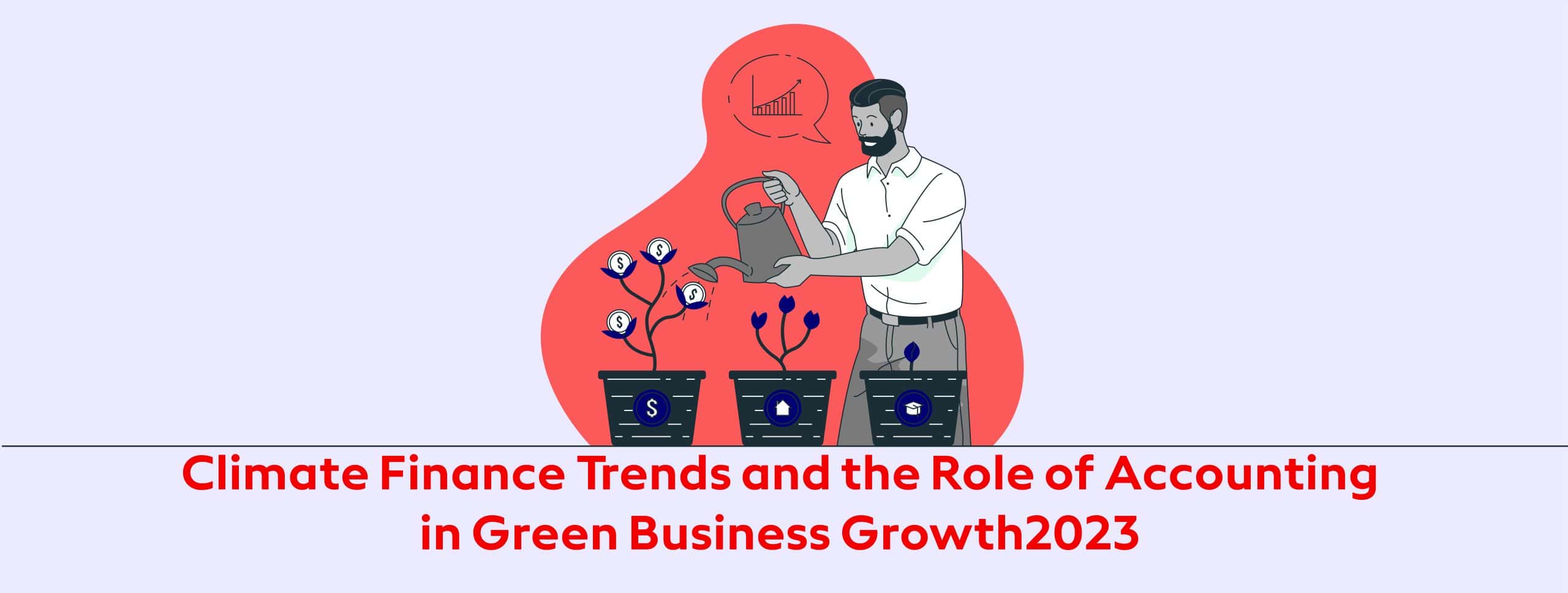Climate Finance
In today’s rapidly changing landscape of Climate Finance , staying up-to-date with the latest trends and developments is crucial for businesses aiming to seize green opportunities. A pivotal factor in this pursuit is the role of accounting, which can greatly contribute to helping enterprises navigate this evolving field. Let’s explore how accounting practices can effectively support businesses in capitalizing on climate-related prospects.
Corporations face increasing pressure from various stakeholders, including investors, advocacy groups, politicians, and industry leaders, to reduce greenhouse gas (GHG) emissions throughout their operations and supply chains. As a response, around 90% of S&P 500 companies now release environmental, social, and governance (ESG) reports that often include estimations of their GHG emissions. However, the existing ESG reports often suffer from inaccuracies, lack verifiability, and present contradictory data.
To address these issues, a proposed solution is the implementation of the E-liability accounting system. This innovative approach combines principles from chemistry, engineering, and cost accounting to accurately measure emissions and attribute them to specific outputs within the value chain. For instance, it can be employed to trace emissions from mining companies to shipping companies and beyond within the supply chain of a car-door manufacturer. The need for an accounting upgrade to drive green innovation led to the establishment of the E-Liability Institute, a global not-for-profit initiative.
Climate Finance Change impact on business
It is crucial for businesses to recognize their role in mitigating Climate Finance change and adopt sustainable practices. Atmospheric CO2 levels have already surpassed pre-industrialization levels by 50%, and GHG emissions resulting from global economic activities are at the core of climate change. The adverse effects of climate change, such as heatwaves, heavy precipitation, droughts, and tropical cyclones, have a direct link to human-induced pollution.

Accountants 's role
Accountants play a significant role in driving Climate Finance action through three primary avenues. First, accurate measurement of emissions and transparent reporting are essential for businesses to understand their environmental impact and communicate it effectively. Second, accountants can identify climate-related risks and integrate them into financial reporting, enabling informed decision-making and risk management. Finally, accountants contribute to innovation by developing new accounting methods that address the unique challenges posed by Climate Finance change.
In the realm of Climate Finance, the Organization for Economic Cooperation and Development (OECD) provides comprehensive information on the annual climate finance provided by developed countries to developing countries. This data includes breakdowns by climate theme, sector, financial instrument, and region. The overarching goal is to mobilize USD 100 billion annually to support climate-related initiatives, highlighting the significance of financial contributions in addressing climate change.
Emerging markets present substantial opportunities for climate business growth, particularly in the realm of green buildings. This sector represents a significant low-carbon investment opportunity, estimated at $24.7 trillion by 2030, in cities across emerging markets. Financiers, governments, developers, and building owners have the power to shape and accelerate this potential by investing in sustainable building practices.
However, inadequate reporting and tracking of Climate Finance data hinder donor accountability. Addressing these issues is crucial for effective climate action, especially in preparation for the upcoming COP27.
In conclusion
Accurate accounting practices that measure emissions precisely and integrate climate considerations into financial reporting are essential for businesses to capitalize on climate-related opportunities. By adopting transparent and robust accounting methods, enterprises can actively contribute to a sustainable future while embracing innovative approaches to address the challenges brought about by climate change.
What are the shortcomings of the GHG Protocol?
The GHG Protocol, which outlines three types of GHG emissions and provides guidance for measuring and reporting them, has certain limitations. The protocol’s scope covers the following categories:
Scope 1: Direct emissions from sources owned or controlled by a company, including production and transportation equipment.
Scope 2: Emissions from facilities that generate electricity purchased and consumed by the company.
Scope 3: Emissions from upstream operations in the company’s supply chain and downstream activities by the company’s customers and end-use consumers.
However, while the GHG Protocol provides explicit guidance for measurement and reporting, it has some drawbacks. For instance, it may not capture all indirect emissions throughout the supply chain, potentially underestimating the true environmental impact of a company’s activities. Additionally, the protocol’s guidelines may lack consistency and standardization, leading to variations in reporting approaches and data quality.
GHG Protocol
To address these issues, there is a need for ongoing refinement and improvement of the GHG Protocol to ensure comprehensive and accurate measurement and reporting of GHG emissions. This could involve enhancing the guidelines for capturing indirect emissions, promoting greater consistency in reporting practices, and integrating emerging accounting methodologies to provide a more holistic understanding of a company’s climate impact.
We cannot quantify the value of achieving net zero; it goes beyond reducing emissions and encompasses a better way of life. Reaching net zero will result in cleaner air and water, improved and healthier homes, sustainable transportation, greener environments, and enhanced habitats for wildlife.
Stay updated on the latest news and announcements from the climate conference by visiting our Climate talk at COP26 hub.
Climate change
Climate change is a significant global challenge that has the potential to affect the well-being of nearly everyone worldwide. It also poses a substantial collective risk to the economy and the financial system. Financial economics, which are designed to evaluate and manage risks related to future outcomes, can aid in assessing and addressing climate change risks.
In recent years, sustainable finance has gained considerable attention as it strives to achieve sustainable development. It is an approach that integrates environmental, social, and governance (ESG) considerations into investment decisions. As we seek to address global challenges comprehensively, it is crucial to explore sustainable finance and differentiate it from similar practices like green and climate finance. Green finance primarily focuses on funding projects that yield environmental benefits, while climate finance specifically targets actions that directly tackle climate change. Both terms fall under the umbrella of sustainable finance, but only encompass the “E” (environmental) aspect of ESG considerations. The Gulf Cooperation Council (GCC) region, like the rest of the world, is increasingly recognizing the importance of incorporating sustainable finance principles into financial systems to promote sustainable development and align with global climate change mitigation and adaptation efforts.
The concept of sustainable finance
The concept of sustainable finance gained momentum in the early 2000s due to factors such as increased awareness of environmental and social issues, the growing significance of corporate social responsibility, and the emergence of new investment products and strategies incorporating ESG factors. Sustainable finance integrates ESG elements into financial decision-making to foster sustainable economic progress and ensure the long-term sustainability of financial systems.
Governments, international organizations, and financial regulators worldwide are taking steps to promote sustainable finance, recognizing its potential to contribute to global sustainability goals like the United Nations Sustainable Development Goals (SDGs) and the Paris Agreement. As sustainable finance continues to grow, financial regulators in many countries are recognizing the need to develop a balanced ecosystem that promotes sustainable practices while effectively managing risks.

To ensure that the financial sector in the GCC supports sustainability goals, several factors must be taken into account. The region faces vulnerabilities to climate change, including issues such as water availability, food security, and social welfare. Given the widespread impact of these concerns, it is crucial to promote sustainable finance and fully integrate environmental, social, and governance (ESG) factors into core financial strategies. This is essential for the GCC to adapt and mitigate the effects of climate change.
As the region progresses towards economic diversification, the GCC’s financial sectors may encounter challenges in meeting commitments due to the complexity and costs of the transition. Governments and business leaders need to expedite their efforts to transition towards sustainable finance to achieve long-term economic success.
The urgency of mobilizing private finance to decarbonize infrastructure globally is well recognized, as the energy, industry, and buildings sectors account for over 70% of global greenhouse gas emissions.
Generally, countries with stable macroeconomic profiles and healthy financial markets tend to be more appealing to banks and institutional investors. In our survey, crowded markets like Australia, the UK, Canada, the US, and Sweden scored significantly higher in terms of financial and macroeconomic factors related to green growth, regulation, and broader commitments to decarbonization. This was in comparison to less developed countries in Asia, South America, and Africa, as shown in Figure.
Investors now actively consider the environmental and social impact of their investments, going beyond purely financial data. While emerging market investments offer higher environmental and social returns, they also come with risks.
Climate change is crucial for businesses
Adapting to climate change is crucial for businesses to avoid economic losses, foster innovation for revenue growth and cost savings, and protect local communities and ecosystems in which they operate. To address these considerations, businesses should focus on three pillars to drive their climate adaptation strategy:
- Enhance resilience: Assess the impacts of climate risks on the business and take action to adapt and build resilience. Collaboration with suppliers and communities in the value chain is essential to enhance business resilience.
- Capitalize on opportunities: Utilize products, services, and business models that help businesses, communities, and ecosystems adapt and build resilience. Pursuing adaptation opportunities that contribute to efficiency, sustainability, and climate change mitigation is also vital.
- Shape collaborative outcomes: Engage in multi-stakeholder efforts that promote action on climate change adaptation and deliver transformative projects to build community and ecosystem resilience.
In this joint report with the World Economic Forum, we explore the risks and opportunities associated with climate change impacts and present a framework that businesses can use to develop their climate adaptation approach.
Why Choose AHG?
AHG is a highly experienced company that specializes in preparing legitimate feasibility studies for investment projects in the Middle East and North Africa. We assess the economic feasibility of proposed projects and analyze the opportunity, including identifying potential obstacles that may hinder the success of your cooperative.
The feasibility study results will determine whether the proposed project should proceed. If the results are positive, the cooperative can proceed with developing an action plan. However, if the project is deemed unfeasible, it should not be pursued.

